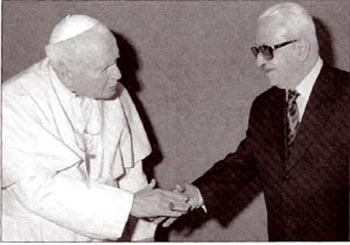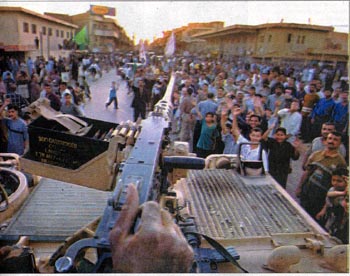 |
War against Terrorism
The Tides of War
Jonathan Tuttle
Over the past several months, numerous articles have appeared by respected traditionalist authors who are vehemently opposed to war in Iraq. The list of those opposed to war with Iraq is eclectic, to say the least: Alec Baldwin, Joseph Sobran, Sean Penn, Patrick Buchanan, Bonnie Franklin, Thomas Droleskey.
Those traditional Catholics against the war in Iraq have been likened to some avowed liberals, such as those mentioned above. It should be said at the outset: this comparison is unfair and unjust. If Pat Buchanan agrees with Bonnie Franklin on an issue, that does not mean that they are alike in any other way. To equate two people like this is not only an illogical argument, it is just plain silly. Furthermore, to equate an anti-war sentiment with being unpatriotic is also unwarranted.
However, that being said, I do take issue with most traditional writers on the issue of war in Iraq. My main concern is not necessarily that many prominent traditionalists are against the war—my primary concern is the methodology which they have applied in their philosophical treatment of the war issue. I believe that their methodology has veered off track. Many traditionalists have presented the anti-war position as the traditionalist position. However, though almost every major traditionalist author today may be staunchly opposed to the war, that doesn’t make it the traditionalist position. The traditionalist position is one that applies the traditional teaching of the Church to an issue, regardless of who may or may not agree. This brings me to an area of concern. There are a number of traditionalist authors writing today who are brilliant. Their methods of applying traditional teachings to current ecclesiastical philosophies and practices are genius. However, the methodology that has been long employed by traditionalists in stating their positions has simply not been used in this case. I will examine some of apparent inconsistencies.
Papal Actions
Throughout his pontificate, many traditionalists have been extremely critical of Pope John Paul II’s actions and philosophy: ecumenical postures, papal apologies, refusals to sanction known pedophiles, and so forth. However, on the topic of this war, many traditionalists have pledged their uncompromising loyalty to the Holy Father. Apparently, they have found nothing to question in this case.
And there is much to question.
 |
John Paul II meets with Deputy Prime Minister Tarek Aziz on February 14 at the Vatican.
The Catholic World Report, March 2003 |
First, although the statements of Pope John Paul II have been characteristically cryptic, the machinery of the Vatican has adopted a clearly pacifistic stance. Not only are the prominent cardinals such as Ratzinger officially opposed to the war, calling it unjust, but the Vatican Secretary of State has publicly opined that war is never moral. Although pacifism may not be technically heretical, it is certainly out of line with tradition.
Second, as I have written elsewhere, the Vatican’s love affair with the United Nations has reached sickening proportions. Cardinal Ratzinger’s official statement concerning war is that "Decisions like this should be made by the community of nations, by the UN, and not by an individual power.” The position of the Vatican has been that war must be done with the approval of the United Nations, and that its disapproval spells injustice. This position is not only ludicrous, but also flies in the face of traditional Catholic teaching on a myriad of counts. Incredibly, many traditionalist authors have responded to this by completely endorsing the Vatican’s stance.
Third, seeing the pope meet with Tariq Aziz right before the war started wasn’t exactly a neutral act. The pope stated that a war with Iraq would be a “defeat for humanity.” The pope wasn’t kind enough to inform us as to why freeing children from torture camps was a “defeat for humanity”. Couldn’t the pope have just once mentioned that it is a “defeat for humanity” to murder people by forcing them into human shredding machines, which is one of the forms of torture in which Hussein seemed to take particular pleasure?
Official statements of the Vatican have made no mention of the fact that Saddam Hussein’s government has attempted genocide, committed systematic torture on women and children, and used chemical weapons on entire villages of suspected non-conformists. Apparently, as far as the Vatican is concerned, those aren’t the real problems in Iraq. What is the real problem in Iraq? What has damaged the people of that country more than anything else?
Answer: look west.
In an official statement, the Vatican stated that: “the known danger of a military action in Iraq which would further inflict sufferance on a population already weakened by many years of embargo." This was a follow-up comment to a quote made by Pope John Paul II in 1998, when he stated that the embargo constituted “biological warfare.”
Apparently, the good people of Iraq were living well with a little genocide, torture, and chemical gassing. But once the evil United States imposed an embargo on Iraq, and then the real problems began. This stance by the Vatican is insulting to the American people, much more so to the Iraqi people, and shows a callous disregard for the facts. It also went entirely unnoticed by many traditionalist columnists, who instead lined up to endorse the position of the Vatican.
Political Consecration and Prayers
As all readers of this journal are no doubt aware, the country of Iraq was consecrated to Our Lady shortly before the bombing campaign began. Isn’t it just a little coincidental that the consecration took place at almost the exact moment bombs began falling, as if to say, “Queen of Heaven, please protect us from the evil foreign Western aggressors”? I don’t appreciate people using Our Lady as a political weapon. This was a thinly veiled political chess match in which the pawns of Saddam attempted to bring out someone else‘s Queen.
Regardless of the surrounding political environment, the traditionalists I grew up with would have condemned this action as an interfaith service. But instead of questioning this ecumenical service, many traditionalists lauded this as an epochal event. Do traditionalists now look the other way regarding interfaith gatherings when they align with their own opinions?
The politicization of prayer continues. For those who thought the anti-war stance didn’t have a prayer—they were wrong. There is currently an anti-war prayer available on the internet, written by a prominent traditionalist priest named Father Lawrence Brey. It warrants a complete reference. It reads:
O Lord Jesus Christ, Prince of Peace, we beg Thee for an end to this horrible new dirty war of genocide and destruction now being waged by our leaders.
DELIVER OUR NATION from evil war-mongers, committed to a favored “Foreign Interest” and to “Big Oil,” in their new and dastardly attack upon the Nation of Iraq. This Land, the sacred site of Man’s Creation and the Garden Eden, is now under tremendous bombardment; -- this land, also distinguished by the Three Wise Men, the Apostle St. Thomas, and ancient Apostolic churches.
COMFORT AND HAVE MERCY on the many innocent people being maimed or slaughtered by our bombardments; and the many Iraqi children, long starving because of Allied embargoes. Also help and sustain the many Eastern Rite Catholics and their bishops and priests, also suffering from this aggression.
BRING OUR BOYS back home and save them from being slaughtered or disabled in this senseless, evil, and unjust war.
BRING TO JUSTICE those of our leaders and allies who are responsible for this barbarism, of whom we should all be truly ashamed.
O ST. IRENE, whose image shed tears before recent Mid-East Wars, pray for an end to this unjust war against the Iraqi people.
O HOLY MARY, QUEEN OF PEACE, by thy intercession, may Jesus Christ, King of Peace, grant us that peace which the world cannot give. O Virgin Mother of God, Queen of Peace and Comfort of the Afflicted, for this we pray with all our hearts and souls. AMEN! (Emphasis mine)
I’m not sure if this prayer fits neatly into our nightly scheduled prayers: the Rosary, the Memorarae, the prayer of reparation for the sins committed against the name of Jesus, and, last but not least, the “Big Oil” prayer? I can picture my three-year-old tugging the dress of my wife, looking up at her with his big brown eyes and asking, “Mommy, can we say that ‘senseless war-monger prayer’ tonight?” Whether or not you are of the opinion that this war is just, I think Our Lord and Our Lady would probably prefer a prayer without all the sycophantic melodrama.
America’s Interest
A constant argument made by many traditionalists is that this war is not in America’s interest. It is here that some traditionalists begin to walk a very fine line. By arguing this point, many are adopting two distinct positions. First, America is almost entirely corrupt, immoral in action, imperialist in philosophy, and governed by liars. Second, America’s interests must come first.
Am I alone when I wonder: “Which is it?” If America is that bad, why do its interests even become part of the equation? After all, if America is that bad, why should we bother fighting for it on our own soil, much less anyone else’s?
Traditionalists have long decried the American Church, or AmChurch, with good reason. Those who give greater import to the fact that they are Americans over the fact that they are Catholics should rightfully be criticized. However, how is one to react when he sees a traditionalist who appeals more to American constitutional law than he does to St. Thomas or St. Augustine?
Many seem to contend that unless the United States is directly threatened with immanent nuclear attack, then America has no business in that place. However, in his treatment on just war in the Summa, St. Thomas never proposes that a country should exclusively seek its own national interests in war. St. Thomas doesn’t mention anything about “national interests” in his just war doctrine.
Relatedly, if the national interest argument were only relevant to defending one’s own country, then one would think that St. Thomas would have inspected the question of just war in his section on justice. However, St. Thomas examines the question of just war in his section on charity. To defend oneself is an act of justice—to defend others is an act of charity. In real life, the “national interest” argument doesn’t mean much to a child in a torture camp. It is a charitable act to defend the defenseless, wherever they may be. There are no borders in the City of God.
Supporting the Troops
There is no escaping the fact that if a war is unjust (not merely, imprudent, but unjust), then anyone who fights in that war is committing an objective mortal sin. Some traditionalists have admitted this. They further argue that, while the soldier is committing objective mortal sin, the individual soldiers are not guilty of a subjective mortal sin, and therefore have no culpability. However, and herein lies the crux of the question, how can these traditional Catholics back those who are, in their eyes, committing objective mortal sin? They have essentially written, “even though this war is patently unjust, we must support the troops.” This position doesn’t wash, and prompts the question: “What other objective mortal sins are they rooting for?” Does anyone say: "Sodomy is unjust, but we must completely support Timmy who is about to perform sodomy?"
Many traditionalist writers seem to want to have their cake and eat it too. They want to be against the war, but they don't want anyone, especially American troops, to dislike them for it.
 |
Marines taking Baghdad Highway Bridge.
Time, April 21, 2003 |
This problem has created another. The U.S. military has a significant percentage of Catholics—many of them are traditionalists. Imagine the life of a traditionalist soldier. He is sent away from his wife and children to risk his life in a foreign land. Along the way, he liberates children from a political torture camp, risks his life to free an American prisoner of war, and between the hugs and kisses from those he has liberated, attempts to evangelize them about Christ. Six months later, he comes home, picks up his favorite traditionalist magazine, and reads that this war was objectively “evil”, “barbaric”, “dastardly”, “senseless”, “unjust”, and “shameful”; carried out by evil men, and that anyone who thought it was a just war is a “lunatic”.
It’s a shame, but that is what the heroic traditionalist soldiers have to look forward to when they come home.
A soldier does enough second-guessing about his war-time actions on his own without hearing it from everybody else, especially from those whom “theatre of operations” refers to standing in line to see Gods and Generals.
St. Thomas
In all their writings against the war, it is strange how infrequently traditionalists have quoted traditional authorities on the matter, such as St. Thomas, St. Augustine, and many others. In a typical traditionalist piece, you are more likely to see a quote from Woodrow Wilson than St. Thomas Aquinas. Apparently, others have noticed this as well. Rev. Richard John Neuhaus recently commented on this problem, writing:
"As it happens, there is in the Catholic tradition a considerable literature on prudential moral action in the face of aggressive threats and great injustice. Augustine, Aquinas, Francisco de Vitoria, and Francisco Suarez, for example, all addressed these questions. The almost total absence of reference to such recognized authorities in statements by Catholics, including bishops and curial officials in Rome, was impressive. Of course there are novel elements in any historical circumstance, but it is particularly unseemly for Catholics to talk like neophiliacs, so enamored of the new that they forget the centuries of reflection that is the Catholic moral tradition." (Emphasis mine.)
Instead of criticizing the Vatican and the bishops who refused to reference traditional Catholic thought, many traditionalist writers followed suit, citing no one but themselves. In all the anti-war writings of traditionalists I have read, I have seen a total of one reference to St. Thomas, whose just war principles are so highly regarded that Catholics and non-Catholics alike have appealed to these principles for centuries. Based on my research, the Vatican itself has not appealed to St. Thomas in its just-war discussions—the Vatican appeals solely to the new Catechism. Here’s the problem: St. Thomas himself is never quoted in the section of the new Catechism on war. To those in power, the Summa is a dead letter. That is appalling.
The “dumb ox” has bellowed, and the world has shaken, but it shakes no longer—St. Thomas has been struck dumb.
 |
St. Thomas Aquinas
by Fra Angelico |
Yet, whether agreeing or not with this war, a true traditionalist would insist on appealing to these principles to formulate an opinion, and he would demand that others do as well.
St. Thomas mentions three conditions. First, the authority of the sovereign; second, just cause; and third, rightful intention.
The authority of the sovereign. It has been argued by traditionalists against the war that since Congress never actually issued a formal declaration of war, Bush did not have authority to act in Iraq. Granted, it’s an interesting argument, and one of the more thought-out arguments I’ve heard from the other side. However, there are two main problems with this position. First, Congress has expressly granted to the President all power to do what has been done. The Article I, Section 8 Declare War Clause does not exclude executing military action by other means than a formal declaration of war. However, Congress rarely issues formal declarations of war. Congress never issued a formal declaration of War during Reagan’s presidency, yet the U.S. military was fairly busy during his tenure.
Second, the argument that the president does not have the power to declare war without a formal Congressional act is an arbitrary construct of constitutional law. To say that a president does not have the power to make war places merely American Constitutional law over natural law. The United States has a natural law right to protect herself, without appeal to constitutional law. In their writings on the topic of war, Catholic scholars throughout history, from Augustine to Bellarmine, speak of the right of the “prince,’ not the collective government, to declare war.
However, many traditionalists continue to appeal to constitutional law to make their case, seemingly unaware of the inherent potential conflicts between natural law and American constitutional law. Case in point, the First Amendment, which reads: “Congress shall make no law respecting an establishment of religion, or prohibiting the free exercise thereof.” The idea that no law can prohibit the exercise of religions hostile to the Catholic Faith is completely against the traditional teachings of the Catholic Church. If we were to debate the issue of religious liberty, would traditional Catholics appeal to the Constitution on this issue as well?
Just Cause. Thomas writes that: “ those who are attacked, should be attacked because they deserve it on account of some fault.” Saddam Hussein is personally guilty of mass murder, institutionalized rape and torture, and attempted genocide. The Iraqi army has supported their leader in his murderous enterprises. It is hard to conceive of a cause which is more just.
Rightful Intention. Under this heading, St. Thomas mentions “securing peace” (removing weapons of mass destruction) and “punishing evil-doers” (removing Saddam).
Three conditions are required, three conditions are present.
Playing Defense
It should be understood that Thomistic just war principles apply to the aggressor of that particular action. Obviously, St. Thomas did not produce a just war doctrine to theologically enable a country to justify defending itself after it has been attacked. Thus, the Thomistic just war doctrine did not need to be employed when the United States declared war on Japan.
The right of self-defense precedes any just war doctrine, whether Thomistic or Augustinian. So, if it is the case that Saddam Hussein directly sponsored or directly funded the 9/11 attacks, the attack on the U.S.S. Cole, the attempted the assassination of former President Bush, the bombing of the U.S. embassies in Kenya and Tanzania in 1998, or committed any other blatant act of war, one need not even appeal to the Thomistic just war doctrine.
A fortiori, the case against Iraq would be just.
Embargo
The Vatican, and by extension those who have endorsed the Vatican’s position, have adopted some very interesting, and very contradictory, thoughts regarding the United Nations and the issue of embargo.
The Vatican has taken the position that the United States does not have the power to declare war, at least in this instance. Regarding Iraq, the only legitimate war-making body is the United Nations. The Vatican has even bluntly stated that the United Nations is in a singular position to determine the most prudent course of action in Iraq. In short, the United Nations understands the situation much better than Westerners ever could.
The Vatican has also taken the position that the chief weapon of oppression against the Iraqi people has been the embargo against that country. Of course, the Vatican and the anti-war crowd have been very careful to refrain from pointing out that the United States didn’t impose the embargo. The embargo was imposed by the United Nations!
To attempt a merger of these two thoughts leads one to the following inescapable conclusion. The United Nations, the body that understands the Iraqi plight better than any other entity, is guilty of imposing “biological warfare” on the country, yet this fact does not preclude them from being the only legitimate decision-making entity regarding the fate of Iraq from this point forward. Though this position is contradictory, that hasn’t stopped anyone from adopting it.
Of course, an embargo is usually an incidental policy when it is imposed on a people who are already in the throws of totalitarianism. In totalitarian regimes, food is always used a weapon. However, if the embargo is truly that devastating—if it truly constitutes biological warfare—then we should seek to end it immediately, and the power that brings the embargo to an end should be congratulated.
The embargo against Iraq has ended, and the United States just ended it. By overthrowing Saddam’s regime, the United Nations’ embargo is no longer in effect. If the embargo were really that bad, why isn’t it front page news that the Americans have brought this devastating chapter of Iraqi history to an end?
Conclusion
The fact that many traditionalists are against the war does not make them bad Catholics, as some have unfortunately suggested. However, the fact that many traditionalists have been such vocal opponents of the war is not without consequence. The lack of appeal to traditional sources among traditionalists has been confusing and regrettable.
It was one thing to question this war three months ago. It was another thing to question it once we had deployed American troops in battle. And, it is quite another to question it today.
Three months ago, even though a Catholic should have accepted the fact that the war was just according to Thomistic principles, he could have maintained that it was imprudent.
Once we deployed troops on the field of combat, there was little benefit to continue to insist that the war was unjust. As Vietnam veterans will attest, anti-war rhetoric deteriorates into anti-troop rhetoric at the exact moment of deployment.
At this moment in time, after the toppling of Saddam and his likenesses, the anti-war rhetoric has literally become yesterday’s news. It has turned out to be the sound and fury amounting to nothing. The anti-war writings now have all the timeliness of a generator the day after Y2K.
Those who have been in favor of the war have seen themselves and their arguments vindicated. By all accounts, the civilian loss of life has been held to an historical minimum, and noble goals have been realized.
No doubt there will still be those who will continue to beat the anti-war drum, retrospectively. After all that has been achieved, that seems to be in poor taste. To claim that wrong has been done admits the corollary that America should fix what it has done, and put everything back where she found it. At this point, if the United States wanted to make amends for this “wrong”, we would have to rebuild all the statues of Saddam, relight the oil fields Saddam attempted to torch, and gather up all the children who were held in political torture camps and throw them back in. Anti-war comments are, at this point, distasteful and insensitive.
 |
American troops entering the streets of Baghdad were
well received by the Iraqi people.
Los Angeles Times, April 13, 2003 |
Ultimately, the people of Iraq would know best if they are better off now than before the United States removed Saddam.
You will currently find them dancing in the streets.
And to those valiant Catholic soldiers who are returning from this war, rest assured, most traditional Catholics, though we may lack prominence, have not lacked prayers for you and for your families. We admire your efforts and celebrate your achievements.
May Our Lady and St. Michael the Archangel continue to protect you.
God will never forget the good you have done.
Posted on April 28, 2003

|
War | Hot Topics | Home | Books | CDs | Search | Contact Us | Donate

© 2002- Tradition in Action, Inc. All Rights Reserved
|
 |
|